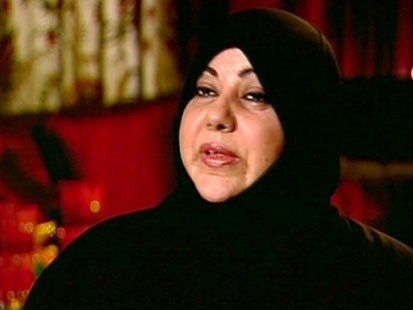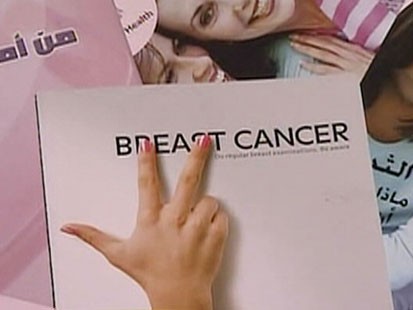Saudi Doctor Brings Breast Cancer to Forefront
Breast Cancer Self-Diagnosis Fueled Passion for Helping Others

Saudi Arabian gynecologist Samia Al-Amoudi has dedicated her life to bringing breast cancer to the forefront of her country's national agenda.
But the doctor, whose face has become synonymous with the disease, was shocked when she was self-diagnosed with breast cancer last year. "I was diagnosed in advanced stage — stage three," Al-Amoudi said. "My tumor is the worst kind of tumor."
Even though she was seeing female patients every day and encouraging them to do their own breast exams, Al-Amoudi never bothered to do one on herself.
Now the country's most famous doctor has become its most famous patient.
"I don't want people to suffer the way I did," Al-Amoudi said. "I want everybody to learn from the lesson."
Al-Amoudi was determined to turn her tragedy into a public lesson that might help others. She began writing articles and a book about breast cancer; she appeared on television to spread awareness.
Only 10 days after she discovered she had breast cancer, Al-Amoudi spoke to a support group and admitted her mistake of not getting a mammogram, a typical occurrence in Saudi Arabia.
Al-Amoudi's passionate speaking engagements opened a long locked door of silence about the subject of breast cancer — Saudi Arabian women historically are tight-lipped about the topic and do not discuss it for a variety of reasons.
Some of them [won't talk about it] because they think it's something very private," Al-Amoudi said. "They feel or they think of it as a taboo." Al-Amoudi hopes to change that attitude.
"She is a pioneer in terms of touching on a subject very personal," said Saudi writer and poet Thuraya Arrayed. "For her to come out and say here I am," Arrayed said, "it is wonderful."
"Dr. Samia is an invaluable resource," said Hala Moddelmog, CEO of the Susan G. Komen for the Cure. "She has been willing and able and capable of talking about breast cancer."
In fact, Al-Amoudi has launched the popular American breast cancer symbol of pink ribbons in Saudi Arabia.
Women who had never dared to speak about the subject now come to see her. One veiled woman said Al-Amoudi had given her the strength and the courage to battle her own breast cancer.
"She's a star for the whole country as a lady who has broken the silence," said Dr. Hassan Nasrat, of the King Abdulaziz Hospital in Saudi Arabia.
Al-Amoudi just hopes her activism will help the world find a cure. "I hope we reach a stage where we can live in a world free of cancer," Al-Amoudi said.
Meanwhile she maintains hope that she will be around for her two children.
"I pray to God to live long enough to bring up my children," she said.
Go to the SOURCE to view a video of Dr. Al Amoudi on Good Morning America
More Arab Women Speaking Out About Breast Cancer
Robin Roberts Talks to Two Cancer Survivors and a Doctor About Changes in the Region

Talking about breast cancer is virtually taboo in the Middle East, but some women there are determined to change that.
"Good Morning America" anchor Robin Roberts talked to three women in the United Arab Emirates committed to bringing breast cancer awareness to their fellow countrywomen -- two are breast cancer survivors, one a leading cancer surgeon.
Fakhria Lufti, a breast cancer survivor, said that the subject is still very hard to talk about in the country.
"There is a lot of women I know, they just don't talk about it, even when they refer to cancer, they just say, 'that disease,'" Lufti said.
Adila Nasser, another survivor, agreed.
"The people around me, my society, don't tell anybody you've got cancer, you mustn't tell people, it's shameful," she said.
Together with Dr. Houriya Kazim, Nasser and Lufti are determined to break the cycle of shame.
Read FURTHER (also with Video)
On a personal note, I lived for five years in Saudi Arabia (1975-1980) and know first hand that talking openly about breast cancer, or any female health problem for that matter, was not done, not then, and even rarely now. I applaud these women, both victims and the doctors who are striding to break this taboo. But I would like to say also, that even here in the United States, many women still do not talk openly about breast cancer, I know this, because it happened in my own family, on my mother's side. They live in the South, where "women's health issues" are still somewhat hush hush in the older generation. My mother had four sisters, three of whom died from breast cancer, one (her younger sister) currently experiencing a recurrence of her own breast cancer, and my mother also a victim and in recovery. My mother doesn't want to talk about it, except in a clinical manner at the most, and she is a retired nurse, her sisters are the same way except for the youngest sister who is very open about it. My only paternal aunt also died of breast cancer, and this deadly combination of every single aunt and my own mother having breast cancer puts me at high risk. A few years ago they found some "abnormalities". At first I had to go a type of biopsy and then three month high intensity mammograms, then after a year, six months, and now I'm down to yearly mammograms. I DREAD them, absolutely dread them. And I will say openly here that I am afraid of breast cancer, very much afraid. Now as each fall rolls around, I know, call the doctor and make your appointment, then wait for the results. But this is PRO-ACTIVE behavior that I cannot avoid even if I wanted to. I saw how my aunts died, in two of them it went to the brain. I see how my one aunt with recurring breast cancer is suffering again with chemo, and I see my mother with her partial mastectomy in one breast. But it has to be done, you HAVE to go to the doctor on a regular basis, because early detection is the KEY to easier treatment-so whether I dread it or not, and believe me I do, I never miss an exam because breast cancer is a HORRIBLE disease to die from.

No comments:
Post a Comment